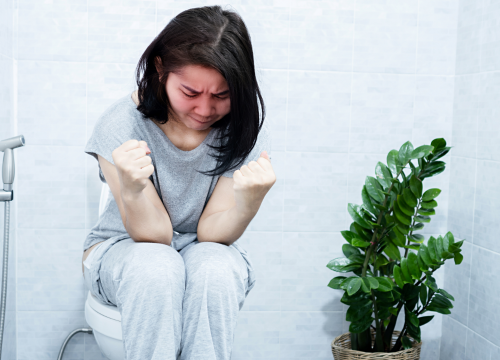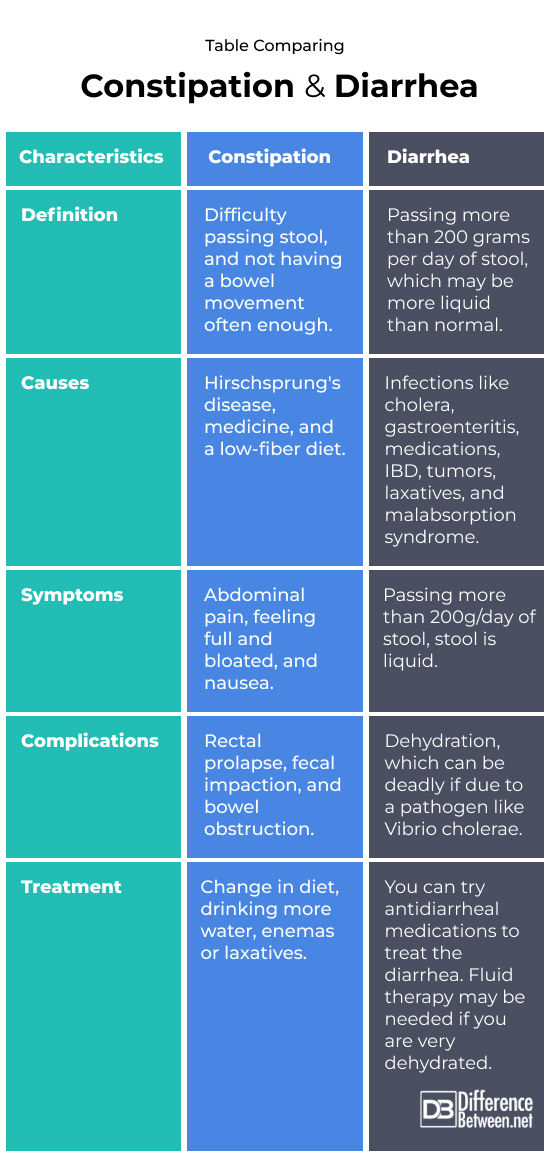Difference Between Constipation and Diarrhea
A person who is constipated is unable to pass stool regularly and may experience problems doing so. Constipation is a very common complaint and can be caused by numerous factors, including certain medicines, like painkillers. Particular medical conditions, such as Hirschsprung’s disease cause severe constipation. The problem with constipation is it can eventually lead to bigger problems like rectal prolapse or even a bowel obstruction. Diarrhea is when a person is passing more than 300 grams of stool per day, bowel movements may be too frequent, and the stool may be liquid in nature; Diarrhea can be due to illness, and in some cases, can lead to dehydration and low blood pressure as a result of fluid loss.
In short, having constipation is when you cannot easily pass stool, and when you do, it is often hard to pass. Diarrhea is when too much stool is passed per day and it is usually more liquid than normal.

What is Constipation?
Definition:
Constipation is when you cannot easily pass stool and may only be able to have a bowel movement once or twice a week. Although, you may not think this is a problem, it can cause unpleasant complications that worsen your health. Complications like fecal impaction or an intestinal obstruction can occur eventually, which can be dangerous.
Symptoms and treatment:
A constipated person usually feels very bloated and uncomfortable. They may also feel nauseated and have some cramping pain in the belly. Laxatives are sometimes helpful in treating constipation, or an enema can be used. Not eating enough fiber can be a reason you have difficulty having a bowel movement, and it can also happen if you are not taking in enough fluid. This means that a diet change can actually benefit you if you are constipated.

What is Diarrhea?
Definition:
Diarrhea is when greater than 200g/day of stool is passed. The bowel movements may also be more frequent and the stool more liquid than usual. How severe diarrhea is often depends on the reason for the condition. In the case of cholera, diarrhea is excessive and profuse, leading to dangerous dehydration and even death, in some cases. Food poisoning can also cause diarrhea, as can certain medications.
Symptoms and treatment:
A person who has diarrhea tends to produce liquid stool that is more than usual. There may also be stomach cramps and the person may need to urgently go to the restroom. Treating diarrhea effectively may depend on why you have the condition. In the case of food poisoning or infection by a pathogen, you may need intravenous fluid therapy at the hospital. This is particularly the case if your diarrhea is so bad that you are very dehydrated. Antidiarrheal medication can help stop the condition in most cases.
Difference between Constipation and Diarrhea?
Definition
Constipation is too few bowel movements a week. Diarrhea is too many bowel movements and passing more than 200g/day of feces.
Causes
Constipation can be caused by a poor diet, but also from medication or other medical problems. Diarrhea can be caused by pathogens, medicine, or a medical condition like inflammatory bowel disease (IBD).
Symptoms
People who are constipated have a sore belly, nausea, and they feel full. People who have diarrhea urgently need to have a bowel movement and produce liquid stool in large quantity; they may also have stomach cramps.
Complications
Constipation can result in complications like rectal prolapse, anal fissures, or even an intestinal blockage. Diarrhea can result in dangerous dehydration including electrolyte imbalances.
Treatment
Laxatives, enemas, and a change in diet can help with constipation. Antidiarrheal medicines and fluid therapy can treat diarrhea.
Table comparing Constipation and Diarrhea

Summary of Constipation Vs. Diarrhea
- Constipation and diarrhea can both be unpleasant conditions that can make you sicker.
- Constipation can sometimes be corrected with enemas and laxatives.
- Diarrhea can be treated with antidiarrheals; sometimes fluid therapy is also needed if the condition is severe.
FAQ
Can you feel constipated and have diarrhea at the same time?
Yes, some types of illness like forms of IBS can cause both constipation and diarrhea to occur. This problem where you have both diarrhea and constipation is also called paradoxical diarrhea.
What simple trick empties your bowels?
It is recommended that you drink water with lemon when you wake up in the morning. The water should be warm.
Can you be constipated with soft stool?
You can have soft stool even if you are suffering from constipation.
What to do when you’re constipated and have diarrhea?
To properly regulate your bowels, you need to change your diet to increase fiber. However, if you continue to experience bowel problems with both constipation and diarrhea you should see your doctor. Paradoxical diarrhea can also happen if you have a bacterial problem in the gut.
What is the 7 second poop trick?
It is recommended that you use a small stool to put your feet on in the bathroom. If you raise your feet and legs up when sitting on the toilet, it is easier to have a bowel movement.
What are the signs of a blocked bowel?
There are a couple of signs of a blocked bowel, such as having a lot of gas, feeling very bloated, having severe abdominal pain, and vomiting.
How do I clear my backed up bowels?
You can take laxatives or use an enema. Then try to eat more high-fiber foods and drink more water.
Can you still poop a little if you have a blockage?
It depends if you have a total or partial blockage. A total blockage will mean you cannot poop at all.
How do you stimulate a bowel movement quickly?
Using an enema or fast-acting laxatives can get the bowels moving quickly.
- Difference Between Rumination and Regurgitation - June 13, 2024
- Difference Between Pyelectasis and Hydronephrosis - June 4, 2024
- Difference Between Cellulitis and Erysipelas - June 1, 2024
Search DifferenceBetween.net :
Leave a Response
References :
[0]Gotfried, Jonathan. “Constipation”. Merckmanuals. Merck & Co., 2022, https://www.msdmanuals.com/professional/gastrointestinal-disorders/symptoms-of-gastrointestinal-disorders/constipation
[1]Gotfried, Jonathan. “Diarrhea”. Merckmanuals. Merck & Co., 2022, https://www.msdmanuals.com/professional/gastrointestinal-disorders/symptoms-of-gastrointestinal-disorders/diarrhea
[2]Mayo Clinic. “Diarrhea”. Mayo Clinic, Mayo Foundation, 2024, https://www.mayoclinic.org/diseases-conditions/diarrhea/symptoms-causes/syc-20352241
[3]Image credit: https://www.canva.com/photos/MAFkkogawPs-chronic-constipation-concept-with-asian-woman-sitting-in-the-toilet-having-the-lumpy-and-difficult-passage-of-hard-stools-and-bowel-movements/
[4]Image credit: https://www.canva.com/photos/MAEQv7YFaHY-woman-with-toilet-paper/
